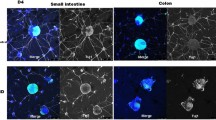Abstract
The enteric nervous system (ENS) derives from neural crest cells, which migrate from the neural tube into the developing gut. The neuronal and glial precursor cells migrate mainly from the oral towards the anal end of the gastrointestinal tract. So far, knowledge about the multipotent influences upon the ENS development, especially its neurotrophic support, derives mainly from knock-out models. The in vitro technique of isolating enteric neuronal precursor cells allows to study the effects of various factors upon their appropriate development in more detail. We therefore adapted the method of growing neurospheres, which are agglomerates of neuronal precursor cells and differentiated neurones and glial cells, from the central nervous system (CNS) for the ENS. The gut of NMRI mice at E12 were dissected, mildly dissociated and plated in 25-cm2 culture flasks. The cultures were maintained in N1 supplemented DMEM/F12 medium with the appropriate neurotrophin cocktails (bFGF, GDNF, Neurturin, CNTF). After several days in culture most of the cells die, while the surviving cells form clusters from which domes, and later spheres arise. The spheres could be harvested and processed for further experiments. First investigations revealed, that the amount of precursor cells was much less in enteric neurospheres as seen in corresponding cultures from the CNS. We found about 43% HNK-1-NCAM+ in enteric and approximately 90% Nestin-+ cells in midbrain neurospheres. Differentiation studies of the enteric neurospheres showed that especially ciliary neurotrophic factor (CNTF) increased the number of enteric neurones (PGP positive), while the amount of HNK-1 precursor cells decreased under the influence of all tested neurotrophins but GDNF. The culture of the freshly dissociated enteric neurospheres in a three-dimensional matrix yielded a secondary network which allows to investigate the pattern formation of the ENS. The generation of enteric neurospheres and the following differentiation and 3D culture in vitro can increase our knowledge of the amount and time point of neurotrophic as well as the ECM-protein influence upon the appropriate development of the ENS.




Similar content being viewed by others
References
Gariepy CE (2001) Intestinal motility disorders and development of the enteric nervous system. Pediatr Res 49:605–613
Furness J, Costa M (1987) The enteric nervous system. Churchill Livingstone, London
Gershon MD, Chalazonitis A, Rothman TP (1993) From neural crest to bowel: development of the enteric nervous system. J Neurobiol 24:199–214
Golden PJ, DeMaro JA, Osborne PA et al. (1999) Expression of Neurturin, GDNF and GDNF family-receptor mRNA in the developing and mature mouse. Exp Neurol 158:504–528
Heuckeroth RO, Enomoto H, Grider JR et al. (1999) Gene targeting reveals a critical role for Neurturin in the development and maintenance of enteric, sensory and presympathetic neurons. Neuron 22:253–263
Milbrandt J, de Sauvage FJ, FahrnerTJ et al. (1998) Persephin, a novel neurotrophic factor related to GDNF and Neurturin. Neuron 20:245–253
Newgreen D, Young HM (2002) Enteric nervous system: development and developmental disturbances. Ped Dev Pathol 5:224–247
Bannerman PGC, Mirsky R, Jessen KR, Timpl R, Duance VC (1986) Light microscopic immunolocalization of laminin, type IV collagen, nidogen, heparan sulphate proteoglycan and fibronectin in the enteric nervous system of rat and guinea pig. J Neurocytol 15:733–743
Jacobs-Cohen RJ, Payette RF, Gershon M, Rothman T (1987) Inability of neural crest cellls to colonize the presumptive aganglionic bowel of ls/ls mutant mice: Requirement for a permissive microenvironment. J Comp Neurol 255:425–438
Moore M, Klein RD, Farinas I, Sauer H, Armanini M, Philips H, Reichhardt LF, Ryan AM, Carver-Moore K, Rosenthal (1996) Renal and neuronal abnormalities in mice lacking GDNF. Nature 382:76–79
Amiel J, Attie T, Jan D et al. (1996) Heterozygous endothelin receptor B mutations in isolated Hirschsprung's disease. Hum Mol Genet 5:347–349
Schäfer KH, Saffrey MJ, Burnstock G (1995) Trophic actions of 2-Chloroadenosine and bFGF on cultured myenteric neurones. Neuroreport 6:937–941
Schäfer KH, Mestres P (1999) Trophic effects of GDNF upon myenteric neurones in vitro decrease with age. Exp Brain Res 125:447–452
Lintz M, Booz KH, Schäfer KH (1999) Combined effect of various neurotrophic factors upon dissociated rat myenteric plexus in vitro. Neurosc Res Com 25:89–96
Schäfer KH, Mestres P (2000) Reaggregation of rat dissociated myenteric plexus in extracellular matrix gels. Dig Dis Sci Vol 45:1631–1638
Reynolds BR, Weiss S (1992) Generation of neurons and astrocytes from isolated cells of the adult mammalian central nervous system. Science 255:1707–1710
Deville F, Ziller C, Le Douarin N (1994) Developmental potentials of enteric neural-crest-derived cells in clonal and mass culture. Dev Biol 163:141–151
Pomeranz HD, Rothman TP, Chalazonitis A, Tennyson VM, Gershon MD (1993) Neural crest-derived cells isolated from the gut by immunoselection develop neuronal and glial phenotypes when cultured on laminin. Dev Biol 156:341–361
Young H, Newgreen D (2001) Enteric neural crest-derived cells: origin, identification, migration and differentiation. Anat Rec 262:1–15
Krammer HJ, Karahan ST, Rumpel E, Klinger M, Kühnel W (1993) Immunohistochemical visualization of the enteric nervous system using antibodies against protein gene product (PGP) 9,5. Ann Anat 175:321–325
Sidebotham EL, Woodward MN, Kenny SE et al. (2001) Assessment of PGP 9.5 as a marker of NC-derived precursor cells in the developing enteric nervous system. Pediatr Surg Int 17:304–307
Oakley RA, Lasky CJ, Erickson CA, Tosney KW (1994) Glycoconjugates mark a transient barrier to neural crest migration in the chicken embryo. Development 103:103–114
Acknowledgements
Supported by the grants 98200/01-201 "Forschungsfonds Klinikum Mannheim" and DFG-grant SCHA878/1-1.
Author information
Authors and Affiliations
Corresponding author
Rights and permissions
About this article
Cite this article
Schäfer, KH., Hagl, C.I. & Rauch, U. Differentiation of neurospheres from the enteric nervous system. Ped Surgery Int 19, 340–344 (2003). https://doi.org/10.1007/s00383-003-1007-4
Accepted:
Published:
Issue Date:
DOI: https://doi.org/10.1007/s00383-003-1007-4




